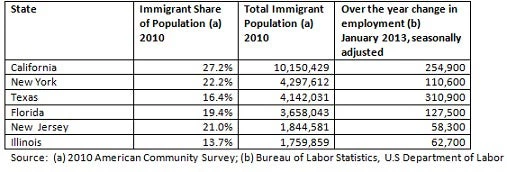In 2010, I wrote a blog on the situation of the H1-B visas. At that time, the slow recovery of the US economy was affecting the hiring of high-skilled immigrants. Now, that the U.S. economy is improving, H1-B visa demand will increase. According to the numbers released today by the Bureau of Labor Statistics “ Forty states and the District of Columbia registered unemployment rate decreases from a year earlier, seven states experienced increases, and three states had no change.” And the US jobless rate of 7.9 percent had no change from December 2012. It is important to underscore that the states with the largest over-the-year job increase are the ones with the largest immigrant population. (See Table)
The economic recovery is affecting workers in certain industries. As job offers increases, the demand for labor rises. In Texas, California, Florida and New York, the largest over-the-year increases occurred in the following industry sec tors: Leisure and hospitality (192,200), professional and business services (180,200), trade, transportation and utilities (174,100) and education and health services (152,700). California and New York recorded the highest over-the-year employment in the professional and business services. While in Florida and in Texas, trade, transportation and utilities as well as leisure and hospitality services registered the largest increases in employment.
It seems that the recovery in the U.S. employment has started in the states where the largest concentration of immigrants reside and in the sectors where the high-skilled labor is concentrated. Thus, the demand for H1-B visa will increase substantially in the fiscal year 2014. According to the U.S. Citizenship and Immigration Services, “this could be the first time since April 2008 that the H1-B cap will require a lottery.” The increase in the applications in the H1- B visa reflects the recovery in the employment rates in the economy. It has been corroborated that H1-B visa demand slows during recessions and increases during the recovery.



Join the Conversation